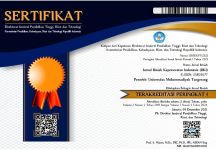Psychosocial Aspects of Erickson Model on Toileting Behavior For Toddler Ages: Case Study
Abstract
Introduction: Toddlers aged 1-3 years are children with psychosocial development stages between autonomy with shame and doubt so training is needed to control themselves, one of which is toilet training. Method: The process of writing this scientific article applied a case study approach with descriptive methods drawn from the writer's life and personal experience. To collect data in the form of articles, the writer used several databases such as PROQUEST, Science Direct, Google Search, and Scopus. The writer also used several search keywords, which are “Toodler Development”, “Erickson Theory”, “Toilet Training”, “Psychosocial Process”, by using boolean “AND”. Besides using keywords, the writer also used inclusion and exclusion criteria ranging from 2012-2017 published articles in Indonesian and English, and full text articles from reliable sources. From the aforementioned searches, thousands of articles were obtained and the writer analyzed and came up with the title “Psychosocial Aspects of Erickson Model in Toileting Behavior for Toddler Ages: Case Study”. Results and Discussion: The development of toddlers varies from one another. Toddlers can also carry out orders given from others to themselves. After entering the age of 24-30 months it is recommended that the children be trained in toileting behavior because at that age they can control themselves. Conclusion and suggestion:Children’s development in this case is still in line with Erikson's psychosocial development theory so that children are still within the psychosocial limits of health. Special attention is needed from parents to toddlers, especially related to their psychosocial development so that there is no delay and does not interfere with children's development at later stage.
Keywords: Psychosocial, Erikson's Theory, Toddler, Toilet Training
Full Text:
Wijoyo_PDFReferences
Cocchiola, Michael, Gayle M. Martino, Lisa J. Dwyer and Kelly Demezzo. (2012). Toilet Training Children with Autism and Developmental Delays: An Effective Program for School Settings. Behav Anal Pract Winter, 5(2): 60-64.
Copeland, K.A., Sherman, S.N., Kendeigh, C.A., Kalkwarf, H.J., Saelens, B.E. (2012). Societal Values and Policies may Curtail Preschool Childresetn’s Physical Activity in Child Care Centers. Pediatrics 129 (2): Pages 265-274.
Fortinash, K.M, Worret P.A. (2012). Psychiatric Mental Health Nursing: 5th Edition. Canada: Elsevier.
Halter, Margaret Jordan. (2014). Varcarolis Foundations of Psychiatrics Mental Health Nursing : A Clinical Approach. St. Louis: Elsevier Mosby.
Hockenberry, Marilyn, David Wilson, Cheryl Rodgers. (2016). Wong’s Essentials of Pediatric Nursing 10th Edition. Elsevier: Mosby.
Kimball, V. (2016). The Perils and Pitfalls of Potty Training. Pediatric Annals: Vol. 45 Pages 199-201.
Leifer, Gloria. (2015). Introduction to maternity and pediatric Nursing, 7th edition. Elsevier Mosby: St. Louis Missouri.
Masadis, G., Filippou, F., Derri, V., Papaioannou, A. (2016). Reliability and validity of the matson evaluation of social skills with youngsters (MESSY II) in Greek context. Sport Science: vol. 9 Pages 92-96.
Meland, A.T., Kaltvedt, E.H., Reikera, E. (2016). Toddlers Master Everyday Activities in Kindergarten: A Gender Perspective. Early Childhood Education Journal: Vol. 44, Pages 349-358.
Moser, T., Reikeras, E. (2016). Motor-life-skill of Toddler-a comparative study of Norwegian and british boys and girls applying the Early Years Movement Skills Checklist. European Early Childhood Education Research Journal.
Townsend, M .(2014). Psychiatric–Mental Health Nursing: Concepts of care in Evidance -Based Practice. 8th ed. Philadelphia: F.A Davis Company
Wight, R.A., Kloos, H. Maltbie, C.V., Carr, V.W. (2016). Can Playscapes Promote Early Childhood Inquiry Toward Environmentally Responsible Behaviour? An Exploratory Study. Enviromental Education Research: Vol. 3, Pages 209-205.
DOI: http://dx.doi.org/10.31000/jiki.v3i1.1485
Article Metrics
Abstract - 7234 Wijoyo_PDF - 6568DOI (Wijoyo_PDF): http://dx.doi.org/10.31000/jiki.v3i1.1485.g1615
Refbacks
- There are currently no refbacks.
Copyright (c) 2020 Jurnal Ilmiah Keperawatan Indonesia (JIKI)
Jurnal Ilmiah Keperawatan Indonesia (JIKI)
Faculty of Health Sciences
Universitas Muhammadiyah Tangerang.
Jl. Perintis Kemerdekaan I/33, Cikokol - Kota Tangerang, Indonesia







